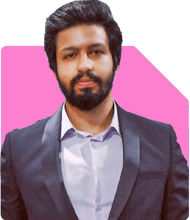Anu Krishna |1746 Answers |Ask -Follow
Relationships Expert, Mind Coach - Answered on Jul 01, 2024
The co-founder of Unfear Changemakers LLP, she has received her neuro linguistic programming training from National Federation of NeuroLinguistic Programming, USA, and her energy work specialisation from the Institute for Inner Studies, Manila.
She is an executive member of the Indian Association of Adolescent Health.... more

Hello Anu, I am female 26 years of age. I am working IT working professional, I earn 1 lack 50 k per month. I come from a very good family in my family everyone is educated and I am the youngest one in my family. My mom and brother are actively looking for groom for me. There wanted me to get married to someone who had good career and coming from good family background. But recently I meet with a guy who stays in Sweden and works as bioinformatics scientist. He is very smart and he is a kind hearted guy. Slowly I got to know about him more. He is simple decent guy he earns pretty good but his parents health is really bad. And during the year 2021 his father got 2 heart stroke and one stroke. They almost in the verse of loosing their father which eventually let his father to decide to get him married to a girl. He got married at the age of 25 in the year 2021. He is currently 29 years old. He is just 2 years older to me. He didn't got chance to talk to her before marriage he pleased the girl parents a lot of time but there were very conservative and didn't allow them to talk, so he told his parents multiple occasions that he is not ready for this marriage his parents started emotionally blackmail him. there said their wanted to see his marriage before they leave this world. So he drawn so emotional and got married to her. After 2 months of marriage he got to know both of there mindset doesn't match at all. Still he given time for her to change so that he can proceed this relationship. Currently there are living together in the Sweden there live like two different strangers, he doesn't allow her to touch him there only talk when it something important to talk. He is not at all happy with the relationship, he is seeking for the divorce but the girl's parents keep on manipulating her, even she is not happy with him, she will say at times I will give divorce but after consulting her parents her decisions keep on changing. There live like 2 different strangers under the same roof. He really loves me alot. I really love his personality and want to get married to him but my parents will never agree to idea of getting married to a divorce person. My parents and my brother brought me up from childhood very over protectively. Almost in all my life I was good quoted child who listens to the elder one. I didn't have courage to speak up about all this to my parents. But at the same time I can't move on from him. I have constant pressure from my parents about marriage. Can you please tell me, how can I handle this situation, should I move on or else should I ask him to talk to my parents. Can you please suggest me. I want to genuinely spend my rest of life with him. I don't have problem with his past marriage because he was forced into that marriage. I really like his personality, he is very hardworking talented guy. He does match most of things I look for a ideal partner. Please give me the suggestion briefly because this is the decision of rest of my life.
You two haven't even met, right? I mean is it a virtual meet?
Even if it's a physical meeting,
- How much do you know of him to be sure that his story is what he says?
- Do you not want to know his wife's version of the entire story especially being a woman, are you not curious?
What people say and what they are might be very different. So, before calling it Love and then taking a decision, ask yourself if you want to go through the divorce with him; I mean you will be part of that journey and then his baggage...do you really want all of that?
What screams RED FLAGS to me is the fact that he keeps changing his decision on whether to leave his wife or not. So, either he has feelings for her OR his story is untrue OR he;s giving his marriage another chance. In none of these cases are you anywhere. Does this not say anything to you? Saying 'I Love You' really doesn't mean a thing when the intention is not a noble or genuine one. Kindly go deeper into his story before doing anything and making any big decisions. Your life. Your decisions...
All the best!
Anu Krishna
Mind Coach|NLP Trainer|Author
Drop in: www.unfear.io
Reach me: Facebook: anukrish07/ AND LinkedIn: anukrishna-joyofserving/
You may like to see similar questions and answers below
Mohit Arora | Answer |Ask -Follow
Dating Coach - Answered on Jul 06, 2024
Ravi Mittal |676 Answers |Ask -Follow
Dating, Relationships Expert - Answered on Oct 28, 2024
Ravi Mittal |676 Answers |Ask -Follow
Dating, Relationships Expert - Answered on Oct 15, 2024
Anu Krishna |1746 Answers |Ask -Follow
Relationships Expert, Mind Coach - Answered on Oct 10, 2024
Anu Krishna |1746 Answers |Ask -Follow
Relationships Expert, Mind Coach - Answered on Aug 21, 2025
Mayank Chandel |2569 Answers |Ask -Follow
IIT-JEE, NEET-UG, SAT, CLAT, CA, CS Exam Expert - Answered on Dec 08, 2025
Mayank Chandel |2569 Answers |Ask -Follow
IIT-JEE, NEET-UG, SAT, CLAT, CA, CS Exam Expert - Answered on Dec 08, 2025

Mayank Chandel |2569 Answers |Ask -Follow
IIT-JEE, NEET-UG, SAT, CLAT, CA, CS Exam Expert - Answered on Dec 08, 2025
Mayank Chandel |2569 Answers |Ask -Follow
IIT-JEE, NEET-UG, SAT, CLAT, CA, CS Exam Expert - Answered on Dec 08, 2025
Mayank Chandel |2569 Answers |Ask -Follow
IIT-JEE, NEET-UG, SAT, CLAT, CA, CS Exam Expert - Answered on Dec 08, 2025
Anu Krishna |1746 Answers |Ask -Follow
Relationships Expert, Mind Coach - Answered on Dec 08, 2025
Ramalingam Kalirajan |10874 Answers |Ask -Follow
Mutual Funds, Financial Planning Expert - Answered on Dec 08, 2025
Samraat Jadhav |2499 Answers |Ask -Follow
Stock Market Expert - Answered on Dec 08, 2025
Ramalingam Kalirajan |10874 Answers |Ask -Follow
Mutual Funds, Financial Planning Expert - Answered on Dec 08, 2025
Radheshyam Zanwar |6737 Answers |Ask -Follow
MHT-CET, IIT-JEE, NEET-UG Expert - Answered on Dec 08, 2025

























